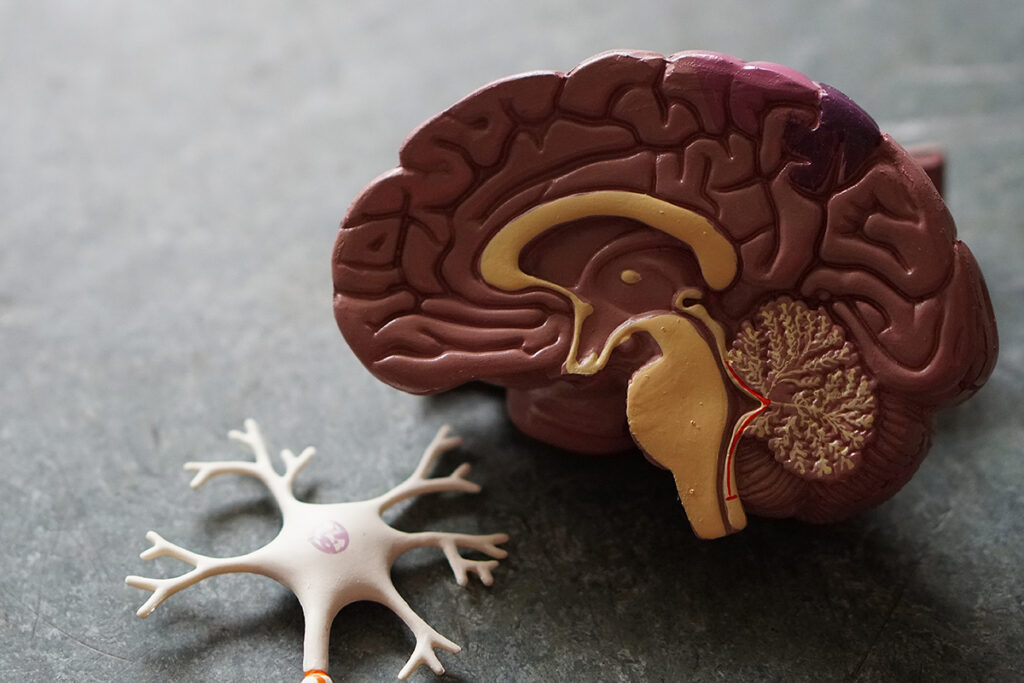A key factor distinguishing individuals who fully recovered from COVID-19 from those with post-COVID syndrome is the low serotonin level. Researchers from the University of Pennsylvania in the USA highlighted this finding. Serotonin deficiency diminishes vagus nerve activity, impairing hippocampal function and memory. Serotonin levels decrease during acute COVID-19 and remain low in post-COVID syndrome.
Serotonin levels decrease due to:
- Inhibition of tryptophan absorption (serotonin precursor) in the gastrointestinal tract.
- Thrombocytopenia reduces serotonin accumulation in platelets—the main reservoir of circulating serotonin.
- Elevated monoamine oxidase (MAO) enzyme levels are responsible for serotonin breakdown.
Viral inflammation diminishes serotonin levels in the blood
Serotonin levels decrease not only during COVID-19 but also in other viral infections. In post-COVID syndrome, the coronavirus persists in the intestines, and viral RNA is detected in the stool of patients with post-COVID syndrome. Chronic coronavirus infection induces inflammation, sustaining serotonin reduction.
Serotonin levels decrease due to persistent interferon signaling. Coronavirus triggers interferon I type (IFN-I) response. Patients with post-COVID syndrome consistently exhibit elevated IFN-I levels. In mouse experiments, inhibiting interferon signaling prevented serotonin level reduction.
Viral inflammation suppresses intestinal tryptophan absorption
Most serotonin is produced in the gastrointestinal tract. Here, serotonin is formed from tryptophan, which comes from food.
In both patients with acute COVID-19 and patients with post-Covid syndrome, the level of tryptophan in the blood is reduced. Experiments on mice have confirmed that low tryptophan can lead to decreased serotonin levels. When mice were fed a diet low in tryptophan, and when inflammation was stimulated in the mice, it decreased serotonin levels.
Tryptophan deficiency is associated with impaired absorption of amino acids in the intestine and depends on type I IFN. During viral inflammation, gene expression in the intestine undergoes significant changes. The activity of genes related to the recognition of viruses and inflammation increases, and the activity of genes associated with the breakdown of nutrients and the absorption of amino acids is also suppressed. In experiments on mice and intestinal organoids, exposure to type I interferons was sufficient to reduce the activity of genes responsible for tryptophan absorption.
Viral inflammation inhibits tryptophan absorption. In an experiment in mice, inflammation reduced systemic tryptophan levels while tryptophan accumulated in the ileum. Tryptophan supplementation compensated for the malabsorption of tryptophan and increased blood levels of tryptophan and serotonin.
Viral inflammation disrupts serotonin accumulation
During synthesis in intestinal cells, serotonin is transferred inside platelets, where it is stored, while free serotonin undergoes rapid breakdown by the enzyme monoamine oxidase (MAO). In mice infected with coronavirus, viral inflammation is accompanied by reduced platelet count, potentially explaining decreased circulating serotonin levels. Thrombocytopenia is independent of tryptophan, as tryptophan supplementation cannot restore normal platelet levels. Reduced platelet levels depend on IFN-I signals.
Viral inflammation contributes to free serotonin breakdown. In the intestines of coronavirus-infected mice, the activity of the MAOA gene, responsible for MAO production, is increased. Consequently, serotonin is broken down more rapidly during coronavirus infection. Inhibiting interferon signaling protects mice from accelerated serotonin breakdown, restoring serotonin levels.
Decreased Serotonin Levels Suppress Vagus Nerve Activity and Impair Memory in Post-COVID Syndrome
The majority of post-COVID syndrome patients report fatigue, cognitive impairments, headaches, reduced endurance, sleep disturbances, anxiety, and memory issues. In mouse experiments, cognitive dysfunction during viral inflammation depended on interferon I type signaling and thrombocytopenia. Treating mice with a selective serotonin reuptake inhibitor (SSRI) restored their ability to recognize new objects, and replenishing tryptophan levels using glycine-tryptophan supplements normalized cognitive functions.
Serotonin is crucial in the hippocampus, the brain region responsible for memory. In viral inflammation, serotonin levels in the brain remain unchanged, indicating that reduced blood serotonin levels are responsible for hippocampal function impairments. While circulating serotonin cannot breach the blood-brain barrier, it can impact the brain through afferent sensory neurons transmitting impulses to the central nervous system. Serotonin depletion causes cognitive impairments due to reduced sensory neuron activity. In mice, tryptophan supplementation and capsaicin—a potent sensory neuron stimulator—restore blood serotonin levels and sensory information transmission and improve cognitive functions during viral inflammation.
Blood serotonin deficiency worsens cognitive functions due to diminished vagus nerve signaling. Restoring normal serotonin levels enhances vagus nerve activity, promoting hippocampal function recovery and cognitive improvement during viral inflammation.
Conclusion
A key factor distinguishing individuals who fully recovered from COVID-19 from those with post-COVID syndrome is low blood serotonin levels. Serotonin deficiency accompanies reduced vagus nerve activity, leading to hippocampal dysfunction and memory deterioration.
Decreased serotonin levels result from suppressed tryptophan absorption, thrombocytopenia, and increased monoamine oxidase (MAO) enzyme levels responsible for serotonin breakdown.
In post-COVID syndrome, the coronavirus may persist in the intestines. Viral inflammation suppresses tryptophan absorption in the intestines, reducing serotonin levels. Chronic inflammation and elevated interferon I type levels contribute to thrombocytopenia and serotonin reduction.
Replenishing tryptophan and serotonin levels using tryptophan supplements and serotonin reuptake inhibitors may improve cognitive functions in post-COVID syndrome.
Useful article, necessary information? Share it!
Someone will also find it useful and necessary:
Reference
Serotonin reduction in post-acute sequelae of viral infection



